Unit 9 Section A Grammar Focus-3c课件(共36张PPT) 2022-2023学年人教版英语八年级上册
文档属性
| 名称 | Unit 9 Section A Grammar Focus-3c课件(共36张PPT) 2022-2023学年人教版英语八年级上册 | 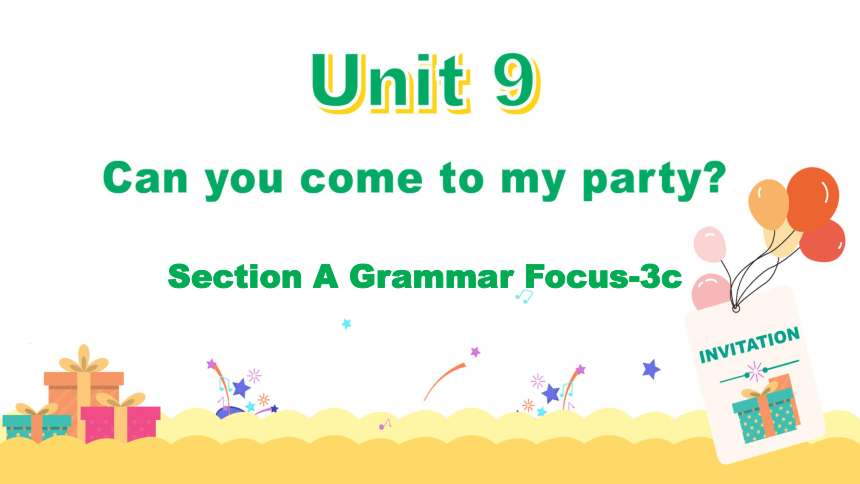 | |
| 格式 | pptx | ||
| 文件大小 | 3.0MB | ||
| 资源类型 | 教案 | ||
| 版本资源 | 人教新目标(Go for it)版 | ||
| 科目 | 英语 | ||
| 更新时间 | 2023-06-03 20:42:14 | ||
图片预览

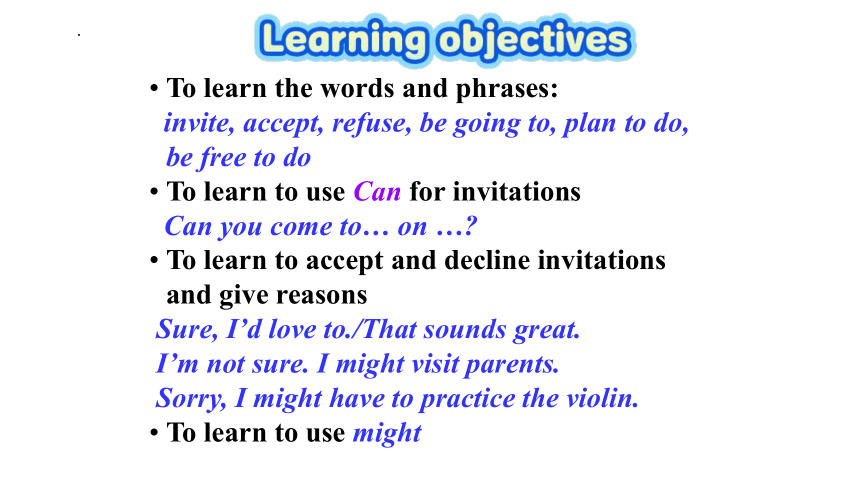
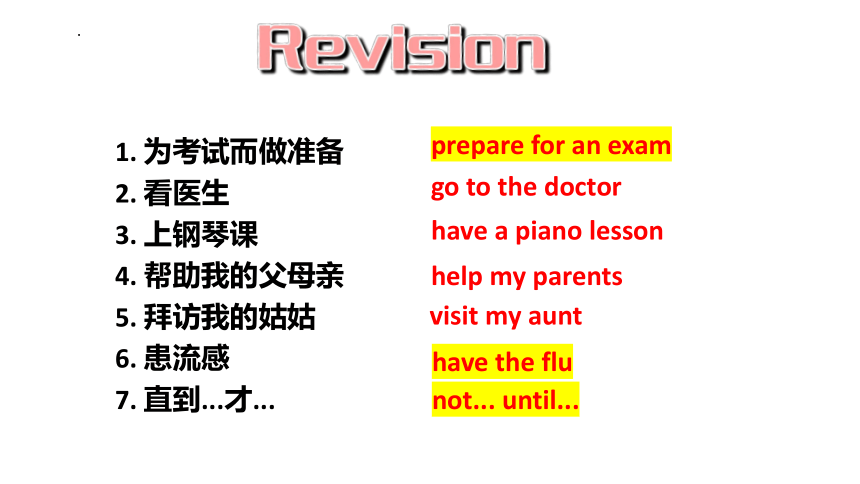
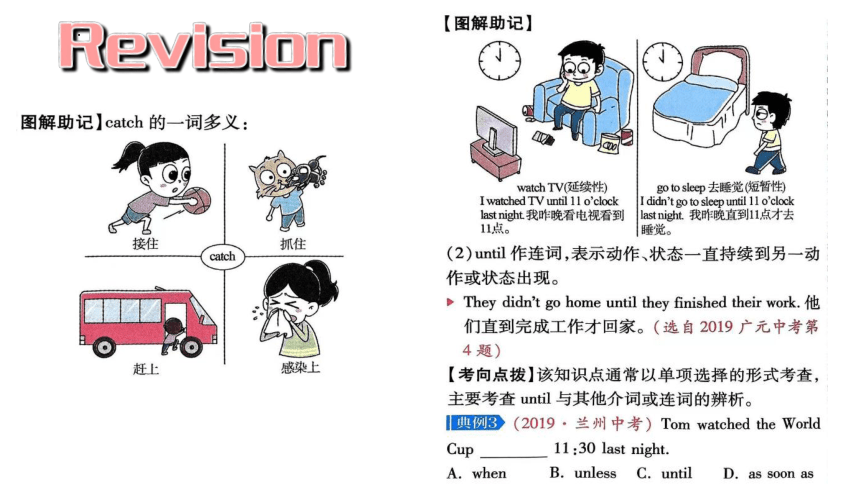
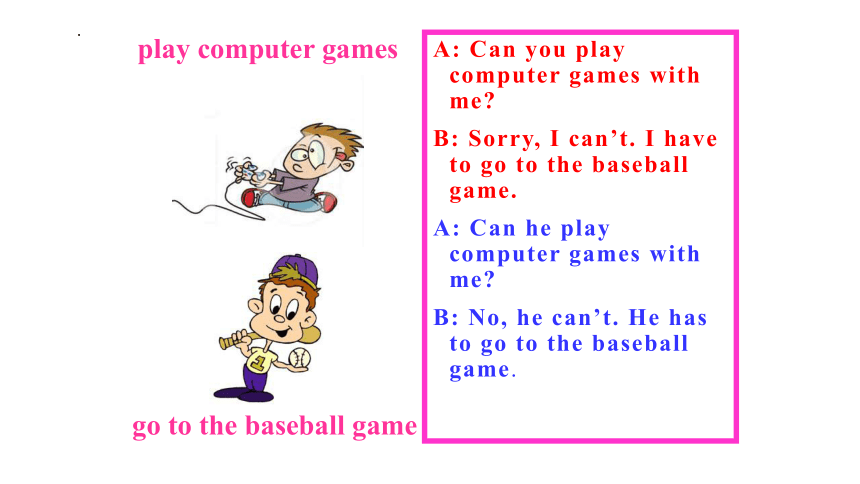
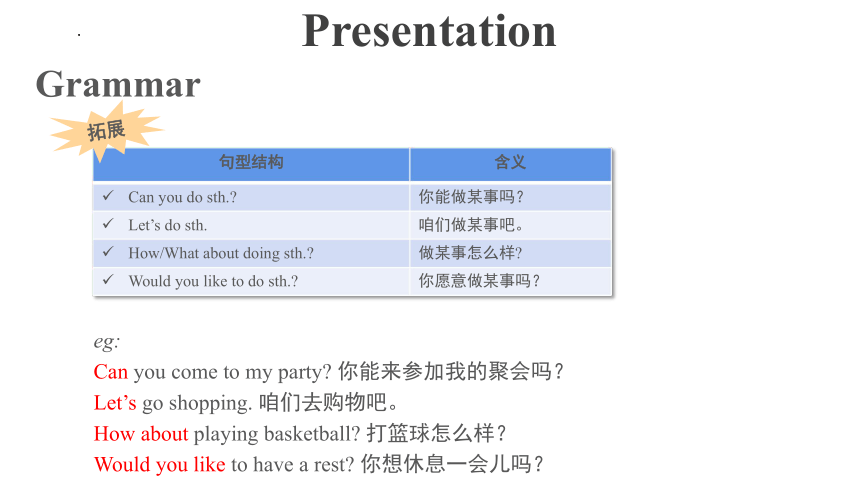
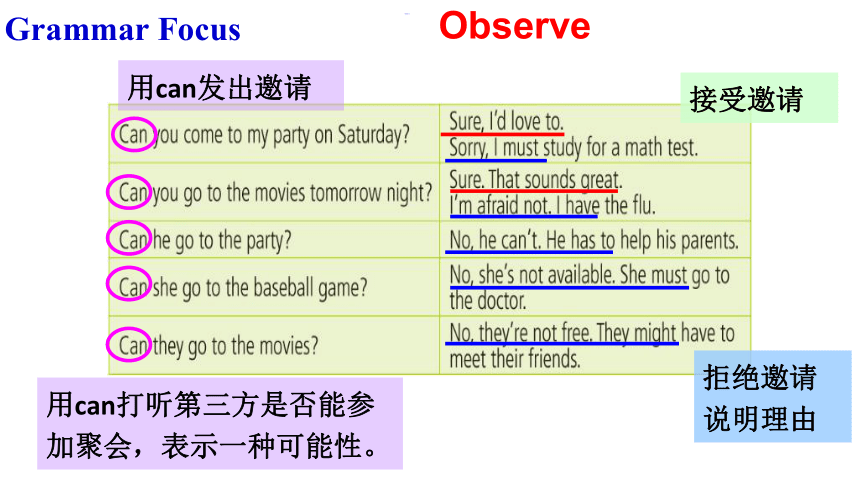
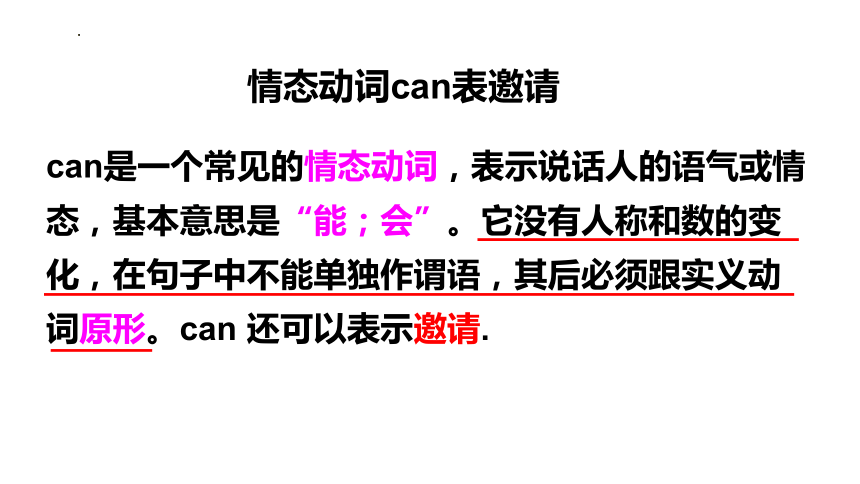
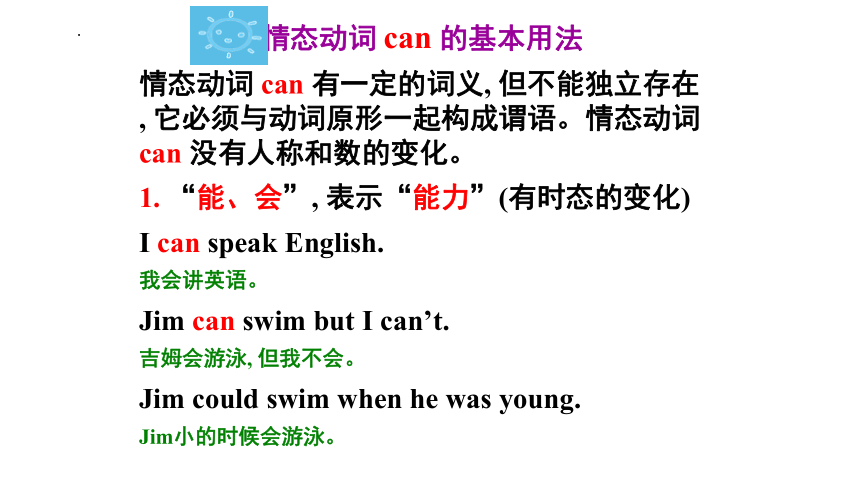
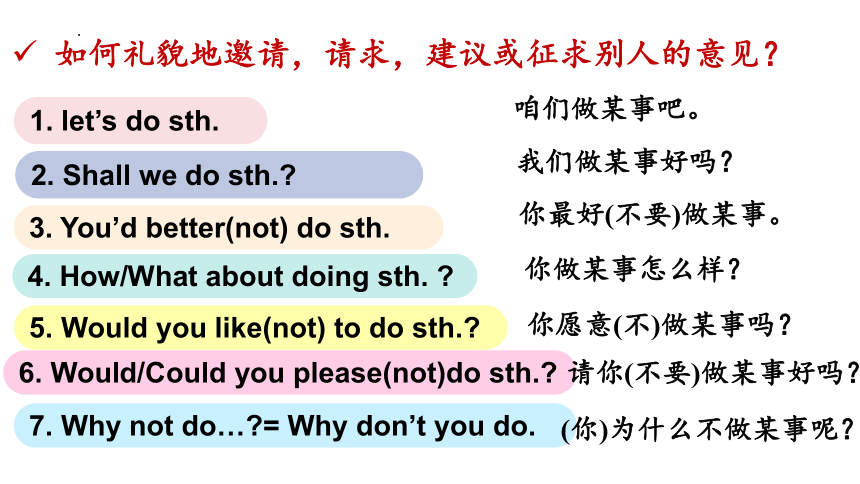
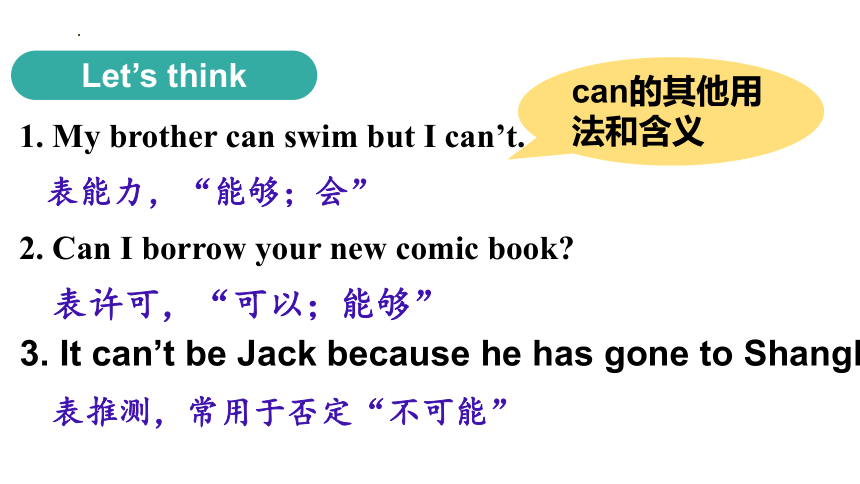
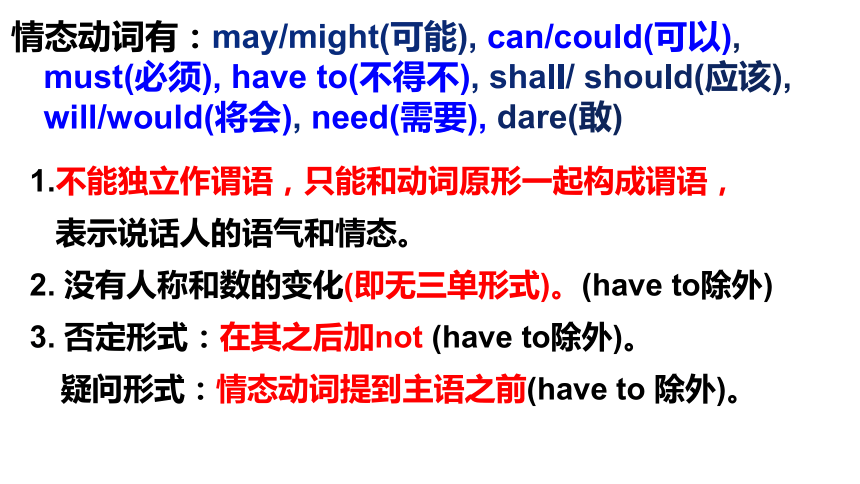
文档简介
(共36张PPT)
Section A Grammar Focus-3c
To learn the words and phrases:
invite, accept, refuse, be going to, plan to do, be free to do
To learn to use Can for invitations
Can you come to… on …
To learn to accept and decline invitations and give reasons
Sure, I’d love to./That sounds great.
I’m not sure. I might visit parents.
Sorry, I might have to practice the violin.
To learn to use might
1. 为考试而做准备
2. 看医生
3. 上钢琴课
4. 帮助我的父母亲
5. 拜访我的姑姑
6. 患流感
7. 直到...才...
prepare for an exam
go to the doctor
have a piano lesson
help my parents
visit my aunt
have the flu
not... until...
A: Can you play computer games with me
B: Sorry, I can’t. I have to go to the baseball game.
A: Can he play computer games with me
B: No, he can’t. He has to go to the baseball game.
play computer games
go to the baseball game
Grammar
Presentation
句型结构 含义
Can you do sth. 你能做某事吗?
Let’s do sth. 咱们做某事吧。
How/What about doing sth. 做某事怎么样
Would you like to do sth. 你愿意做某事吗?
拓展
eg:
Can you come to my party 你能来参加我的聚会吗?
Let’s go shopping. 咱们去购物吧。
How about playing basketball 打篮球怎么样?
Would you like to have a rest 你想休息一会儿吗?
用can打听第三方是否能参加聚会,表示一种可能性。
用can发出邀请
接受邀请
拒绝邀请
说明理由
Observe
Observe
Grammar Focus
can是一个常见的情态动词,表示说话人的语气或情态,基本意思是“能;会”。它没有人称和数的变化,在句子中不能单独作谓语,其后必须跟实义动词原形。can 还可以表示邀请.
情态动词can表邀请
情态动词 can 的基本用法
情态动词 can 有一定的词义, 但不能独立存在, 它必须与动词原形一起构成谓语。情态动词 can 没有人称和数的变化。
1. “能、会”, 表示“能力”(有时态的变化)
I can speak English.
我会讲英语。
Jim can swim but I can’t.
吉姆会游泳, 但我不会。
Jim could swim when he was young.
Jim小的时候会游泳。
1. let’s do sth.
如何礼貌地邀请,请求,建议或征求别人的意见?
2. Shall we do sth.
咱们做某事吧。
5. Would you like(not) to do sth.
6. Would/Could you please(not)do sth.
7. Why not do… = Why don’t you do.
4. How/What about doing sth.
3. You’d better(not) do sth.
我们做某事好吗?
你最好(不要)做某事。
你做某事怎么样?
你愿意(不)做某事吗?
请你(不要)做某事好吗?
(你)为什么不做某事呢?
1. My brother can swim but I can’t.
表能力,“能够;会”
2. Can I borrow your new comic book
表许可,“可以;能够”
3. It can’t be Jack because he has gone to Shanghai.
表推测,常用于否定“不可能”
Let’s think
can的其他用法和含义
情态动词有:may/might(可能), can/could(可以), must(必须), have to(不得不), shall/ should(应该), will/would(将会), need(需要), dare(敢)
1.不能独立作谓语,只能和动词原形一起构成谓语,
表示说话人的语气和情态。
2. 没有人称和数的变化(即无三单形式)。(have to除外)
3. 否定形式:在其之后加not (have to除外)。
疑问形式:情态动词提到主语之前(have to 除外)。
might , can, must 它们都是____动词,用来表达某种感情。
1.might 意思是“________”。
2.can 意思是“________”。
3. must 意思是“______”。(主观)
4.have to 意思是“______”。(客观)
Grammar
情态
必须
不得不
能;会
可能;也许
1. can/may
都可表示“许可” 。may用于较正式、客气的场合,而can比较随便(口语)。
You may/can smoke here.
The policeman says you can’t park here.
2. 情态动词“have to”与其他的情态动词如“can”, “may”
“must” 和 “should” 不同。
1)这4个情态动词没有人称的变化,而have to有, 它的第三
人称单数为“has to” 如:
He should study hard.
He has to study hard.
3. must/have to
must 表示主观上觉得“必须...”;
have to表示客观需要,即“不得不” ,根据客观原因而不得不做某事。 但mustn't 表示禁止。
I don’t like this bike. I must buy a new one.
我不喜欢这辆自行车,我一定要买辆新的。
This bike doesn’t work. We have to buy a new one.
这辆自行车坏了,我不得不买一辆新的。
have to 的用法
4. have (has) to + do
have (has) to 后面要用动词原形。当主语为第三人称单数时用 has to,当句子是过去时用 had to。
We have to leave now.
我们不得不现在就离开。
He has to work on Sunday.
他不得不在周日工作。
I had to do my homework last Sunday.
上周日我不得不做作业。
They might have to meet their friends.
might在此表示推测和可能性。它的可能性比may小。
5. 情态动词might用法
e.g. She might not want to come with us.
她可能不想和我们一起走。
How long might the travel take
这次旅行需要多长时间?
Dad might know how to start that machine.
爸爸也许知道如何发动那台机器。
Let’s compare.
She received his present, but she didn't accept it.
So she refused it right away.
accept “(主观上愿意)接受”
receive “收到”客观上收到或拿到
refuse “拒绝”
refuse to do sth.
拒绝做某事
She refused to accept his present right away.
3a
Complete the answers with might and one of the phrases in the box.
watch TV
on the weekend
my cousin
visit my grandparents
practice the violin
1. A: What are you going to do on
Saturday
B: I’m not sure. I might
_____________________
2. A: What are you planning to do
after school
B: I don’t know.
_____________________
practice the violin.
I might watch TV.
might 表示可能性,用于推测,比may的推测性更小
3. A: When will you finish the science homework
B: ______________________________.
4. A: Who are you going to the movies with
B: __________________________.
5. A: Are you free to come to my place on Saturday
B: ________________________________.
I might finish it on the weekend
I might go with my cousin
Sorry. I might visit my grandparents
might表示把握性不大的推测,意为“可能;也许”。可以对现在、过去或将来的情况进行推测,常用于肯定句、否定句中。might表示的可能性小于may。
It might rain tomorrow.(可能性较小,说话者没有把握)明天可能下雨。
4
Complete the sentences below.Use the words in brackets to help you.
.Inviting:__________________________ (can/play tennis)
Accepting:____________________________________
.Inviting:_____________________________________
(would like to/go to the movies)
Refusing:____________________________________
Reason:________________________________(might have to)
.Inviting:______________________________________
(would like to/come to my birthday party)
Accepting:____________________________________
.Inviting:______________________________________
(can/hang out with us tonight)
Refusing:___________________________________
Reason:___________________________________(must)
Can you play tennis with me
Sure, I’d love/like to.
Would you like to go to the movies tomorrow
Sorry, I’m afraid not/ I’m afraid I can’t.
I might have to practice the piano at home.
Would you like to come to my birthday parrty
Can you hang out with us tonight
Sorry, I’m not available/ I’m not free/ I can’t.
I must look after my little sister.
Sure, that sounds great.
3b
3
2
1
3c
Write down everything you have to do next
week. Choose a day and time to have a party.
Then invite classmates to your party.
A: Can you come to my party
B: When is it
A: Next week, on Thursday night.
B: I’m sorry. I have to study for a math test.
Write down everything you have to do next week.
3c
Morning Afternoon Evening
MON.
TUE.
WED.
THUR.
FRI.
SAT.
SUN.
Production
1. invite v. 邀请 (教材P67 3b Inviting)
常用短语:
invite sb. to some place 邀请某人到某地
invite sb. to do sth. 邀请某人做某事
【拓展】
invitation n. “邀请”,一般和to连用,“……的邀请”。
make an invitation 发出邀请
accept an invitation 接受邀请
turn down/ refuse an invitation 拒绝邀请
Language points:
【语境应用】把下面的汉语句子翻译成英语。
1) 我邀请Jenny去看电影。
____________________________________
2) 我经常收到参加晚会的邀请。
____________________________________
I invite Jenny to go to the cinema.
I often get invitations to the party.
谢谢你的邀请。Thanks for your invitation.
谢谢你邀请了我。 Thanks for inviting me.
补全对话。
A: Hi, Jane! Why didn’t you go to Ann’s party yesterday
B: I didn’t feel well, so I had to (1) _____________________ (拒绝她的邀请). Did she (2) _______________________ (邀请你参加她的派对)
A: Yes. At the party, a beautiful girl (3) _________________________ (邀请我和她唱歌) .
B: Really Sounds fun!
A: Ha ha ... After the party, Ann (4)_____________________________ (邀请我们去一家新电影院) and we watched an interesting movie.
B: You really had a good time.
refuse her invitation
invite you to her party
invited me to sing with her
invited us to a new movie theater
2. accept v. 接受
e.g. They didn’t accept his money.
accept “接受”,强调主观接受。 I’ve received a present from him, but I’m not going to accept it.
receive “收到;接到”,强调客观上收到或拿到,但主观上并不一定会接受。
从搭配上说,在表示“接受教育、受到欢迎、得到支持、接待客人”等时,通常用receive。 Project Hope has helped lots of poor children receive good education.
accept与receive
【语境应用】根据句意选用accept或receive的适当形式填空。
1) Lily ________ a warm welcome when she went into the classroom.
2) Yesterday, Jack ________ an invitation from Mark and ________ it happily.
received
received
accepted
e.g. Lily refused David’s invitation.
The old woman never refuses to help others.
3. refuse v. 拒绝 (后面常接名词、代词或动词不定式),不能接动词-ing形式作宾语。
refuse to do sth. 拒绝做某事
【语境应用】下面句子中的划线部分有一处错误,请指出并改正。
Ann refused playing with her friend because she had to do her homework.
to play
翻译句子。
1) 我拒绝了王丽的邀请。
______________________________________
2) 你最好不要拒绝帮助别人。
______________________________________
I refused Wang Li’s invitation.
You’d better not refuse to help others.
after school 放学后
watch TV 看电视
on the weekend 在周末
visit my grandparents 拜访我的(外)祖父母
practice the violin 练习小提琴
Can for invitations
Modal verb might
单项选择:
1. Joe ______ go to the doctor. His leg is broken.
A. have to B. can
C. has to D. may
2. — Can you help me with my English
— Sure, ______.
A. I’d like B. I’d love
C. I’d love to D. I have to
3. Thanks a lot for ______ me ______ your party.
A. invite; for B. invite; to
C. inviting; for D. inviting; to
4. Sorry, I’m busy today. I have ______ homework to do.
A. much too B. too much
C. too many D. many too
1. 星期六你能来我的聚会吗?
______ you ______ to my party on Saturday
2. 当然,我乐意去。
Sure. ______ ______ ______.
3. 对不起,我必须为数学考试而学习。
Sorry, I ______ ______ ______ a math test.
4. 明天晚上你能去看电影吗?
______ you ______ to the movies ________ night
I’d love to
Can come
must study for
Can go
根据课本内容,完成下列句子。
tomorrow
Consolidation
Group report
Hi, everyone. On Saturday afternoon this weekend, I’m going to have an English party. In my group, there are 5 students. Two students, Cindy and Dale, can come to my party. However, two other students, Bob and Eric, can’t come. Bob has to go shopping with his sister and Eric must prepare for his math test.
Hi, everyone. On ________________this
weekend, I’m going to……
Section A Grammar Focus-3c
To learn the words and phrases:
invite, accept, refuse, be going to, plan to do, be free to do
To learn to use Can for invitations
Can you come to… on …
To learn to accept and decline invitations and give reasons
Sure, I’d love to./That sounds great.
I’m not sure. I might visit parents.
Sorry, I might have to practice the violin.
To learn to use might
1. 为考试而做准备
2. 看医生
3. 上钢琴课
4. 帮助我的父母亲
5. 拜访我的姑姑
6. 患流感
7. 直到...才...
prepare for an exam
go to the doctor
have a piano lesson
help my parents
visit my aunt
have the flu
not... until...
A: Can you play computer games with me
B: Sorry, I can’t. I have to go to the baseball game.
A: Can he play computer games with me
B: No, he can’t. He has to go to the baseball game.
play computer games
go to the baseball game
Grammar
Presentation
句型结构 含义
Can you do sth. 你能做某事吗?
Let’s do sth. 咱们做某事吧。
How/What about doing sth. 做某事怎么样
Would you like to do sth. 你愿意做某事吗?
拓展
eg:
Can you come to my party 你能来参加我的聚会吗?
Let’s go shopping. 咱们去购物吧。
How about playing basketball 打篮球怎么样?
Would you like to have a rest 你想休息一会儿吗?
用can打听第三方是否能参加聚会,表示一种可能性。
用can发出邀请
接受邀请
拒绝邀请
说明理由
Observe
Observe
Grammar Focus
can是一个常见的情态动词,表示说话人的语气或情态,基本意思是“能;会”。它没有人称和数的变化,在句子中不能单独作谓语,其后必须跟实义动词原形。can 还可以表示邀请.
情态动词can表邀请
情态动词 can 的基本用法
情态动词 can 有一定的词义, 但不能独立存在, 它必须与动词原形一起构成谓语。情态动词 can 没有人称和数的变化。
1. “能、会”, 表示“能力”(有时态的变化)
I can speak English.
我会讲英语。
Jim can swim but I can’t.
吉姆会游泳, 但我不会。
Jim could swim when he was young.
Jim小的时候会游泳。
1. let’s do sth.
如何礼貌地邀请,请求,建议或征求别人的意见?
2. Shall we do sth.
咱们做某事吧。
5. Would you like(not) to do sth.
6. Would/Could you please(not)do sth.
7. Why not do… = Why don’t you do.
4. How/What about doing sth.
3. You’d better(not) do sth.
我们做某事好吗?
你最好(不要)做某事。
你做某事怎么样?
你愿意(不)做某事吗?
请你(不要)做某事好吗?
(你)为什么不做某事呢?
1. My brother can swim but I can’t.
表能力,“能够;会”
2. Can I borrow your new comic book
表许可,“可以;能够”
3. It can’t be Jack because he has gone to Shanghai.
表推测,常用于否定“不可能”
Let’s think
can的其他用法和含义
情态动词有:may/might(可能), can/could(可以), must(必须), have to(不得不), shall/ should(应该), will/would(将会), need(需要), dare(敢)
1.不能独立作谓语,只能和动词原形一起构成谓语,
表示说话人的语气和情态。
2. 没有人称和数的变化(即无三单形式)。(have to除外)
3. 否定形式:在其之后加not (have to除外)。
疑问形式:情态动词提到主语之前(have to 除外)。
might , can, must 它们都是____动词,用来表达某种感情。
1.might 意思是“________”。
2.can 意思是“________”。
3. must 意思是“______”。(主观)
4.have to 意思是“______”。(客观)
Grammar
情态
必须
不得不
能;会
可能;也许
1. can/may
都可表示“许可” 。may用于较正式、客气的场合,而can比较随便(口语)。
You may/can smoke here.
The policeman says you can’t park here.
2. 情态动词“have to”与其他的情态动词如“can”, “may”
“must” 和 “should” 不同。
1)这4个情态动词没有人称的变化,而have to有, 它的第三
人称单数为“has to” 如:
He should study hard.
He has to study hard.
3. must/have to
must 表示主观上觉得“必须...”;
have to表示客观需要,即“不得不” ,根据客观原因而不得不做某事。 但mustn't 表示禁止。
I don’t like this bike. I must buy a new one.
我不喜欢这辆自行车,我一定要买辆新的。
This bike doesn’t work. We have to buy a new one.
这辆自行车坏了,我不得不买一辆新的。
have to 的用法
4. have (has) to + do
have (has) to 后面要用动词原形。当主语为第三人称单数时用 has to,当句子是过去时用 had to。
We have to leave now.
我们不得不现在就离开。
He has to work on Sunday.
他不得不在周日工作。
I had to do my homework last Sunday.
上周日我不得不做作业。
They might have to meet their friends.
might在此表示推测和可能性。它的可能性比may小。
5. 情态动词might用法
e.g. She might not want to come with us.
她可能不想和我们一起走。
How long might the travel take
这次旅行需要多长时间?
Dad might know how to start that machine.
爸爸也许知道如何发动那台机器。
Let’s compare.
She received his present, but she didn't accept it.
So she refused it right away.
accept “(主观上愿意)接受”
receive “收到”客观上收到或拿到
refuse “拒绝”
refuse to do sth.
拒绝做某事
She refused to accept his present right away.
3a
Complete the answers with might and one of the phrases in the box.
watch TV
on the weekend
my cousin
visit my grandparents
practice the violin
1. A: What are you going to do on
Saturday
B: I’m not sure. I might
_____________________
2. A: What are you planning to do
after school
B: I don’t know.
_____________________
practice the violin.
I might watch TV.
might 表示可能性,用于推测,比may的推测性更小
3. A: When will you finish the science homework
B: ______________________________.
4. A: Who are you going to the movies with
B: __________________________.
5. A: Are you free to come to my place on Saturday
B: ________________________________.
I might finish it on the weekend
I might go with my cousin
Sorry. I might visit my grandparents
might表示把握性不大的推测,意为“可能;也许”。可以对现在、过去或将来的情况进行推测,常用于肯定句、否定句中。might表示的可能性小于may。
It might rain tomorrow.(可能性较小,说话者没有把握)明天可能下雨。
4
Complete the sentences below.Use the words in brackets to help you.
.Inviting:__________________________ (can/play tennis)
Accepting:____________________________________
.Inviting:_____________________________________
(would like to/go to the movies)
Refusing:____________________________________
Reason:________________________________(might have to)
.Inviting:______________________________________
(would like to/come to my birthday party)
Accepting:____________________________________
.Inviting:______________________________________
(can/hang out with us tonight)
Refusing:___________________________________
Reason:___________________________________(must)
Can you play tennis with me
Sure, I’d love/like to.
Would you like to go to the movies tomorrow
Sorry, I’m afraid not/ I’m afraid I can’t.
I might have to practice the piano at home.
Would you like to come to my birthday parrty
Can you hang out with us tonight
Sorry, I’m not available/ I’m not free/ I can’t.
I must look after my little sister.
Sure, that sounds great.
3b
3
2
1
3c
Write down everything you have to do next
week. Choose a day and time to have a party.
Then invite classmates to your party.
A: Can you come to my party
B: When is it
A: Next week, on Thursday night.
B: I’m sorry. I have to study for a math test.
Write down everything you have to do next week.
3c
Morning Afternoon Evening
MON.
TUE.
WED.
THUR.
FRI.
SAT.
SUN.
Production
1. invite v. 邀请 (教材P67 3b Inviting)
常用短语:
invite sb. to some place 邀请某人到某地
invite sb. to do sth. 邀请某人做某事
【拓展】
invitation n. “邀请”,一般和to连用,“……的邀请”。
make an invitation 发出邀请
accept an invitation 接受邀请
turn down/ refuse an invitation 拒绝邀请
Language points:
【语境应用】把下面的汉语句子翻译成英语。
1) 我邀请Jenny去看电影。
____________________________________
2) 我经常收到参加晚会的邀请。
____________________________________
I invite Jenny to go to the cinema.
I often get invitations to the party.
谢谢你的邀请。Thanks for your invitation.
谢谢你邀请了我。 Thanks for inviting me.
补全对话。
A: Hi, Jane! Why didn’t you go to Ann’s party yesterday
B: I didn’t feel well, so I had to (1) _____________________ (拒绝她的邀请). Did she (2) _______________________ (邀请你参加她的派对)
A: Yes. At the party, a beautiful girl (3) _________________________ (邀请我和她唱歌) .
B: Really Sounds fun!
A: Ha ha ... After the party, Ann (4)_____________________________ (邀请我们去一家新电影院) and we watched an interesting movie.
B: You really had a good time.
refuse her invitation
invite you to her party
invited me to sing with her
invited us to a new movie theater
2. accept v. 接受
e.g. They didn’t accept his money.
accept “接受”,强调主观接受。 I’ve received a present from him, but I’m not going to accept it.
receive “收到;接到”,强调客观上收到或拿到,但主观上并不一定会接受。
从搭配上说,在表示“接受教育、受到欢迎、得到支持、接待客人”等时,通常用receive。 Project Hope has helped lots of poor children receive good education.
accept与receive
【语境应用】根据句意选用accept或receive的适当形式填空。
1) Lily ________ a warm welcome when she went into the classroom.
2) Yesterday, Jack ________ an invitation from Mark and ________ it happily.
received
received
accepted
e.g. Lily refused David’s invitation.
The old woman never refuses to help others.
3. refuse v. 拒绝 (后面常接名词、代词或动词不定式),不能接动词-ing形式作宾语。
refuse to do sth. 拒绝做某事
【语境应用】下面句子中的划线部分有一处错误,请指出并改正。
Ann refused playing with her friend because she had to do her homework.
to play
翻译句子。
1) 我拒绝了王丽的邀请。
______________________________________
2) 你最好不要拒绝帮助别人。
______________________________________
I refused Wang Li’s invitation.
You’d better not refuse to help others.
after school 放学后
watch TV 看电视
on the weekend 在周末
visit my grandparents 拜访我的(外)祖父母
practice the violin 练习小提琴
Can for invitations
Modal verb might
单项选择:
1. Joe ______ go to the doctor. His leg is broken.
A. have to B. can
C. has to D. may
2. — Can you help me with my English
— Sure, ______.
A. I’d like B. I’d love
C. I’d love to D. I have to
3. Thanks a lot for ______ me ______ your party.
A. invite; for B. invite; to
C. inviting; for D. inviting; to
4. Sorry, I’m busy today. I have ______ homework to do.
A. much too B. too much
C. too many D. many too
1. 星期六你能来我的聚会吗?
______ you ______ to my party on Saturday
2. 当然,我乐意去。
Sure. ______ ______ ______.
3. 对不起,我必须为数学考试而学习。
Sorry, I ______ ______ ______ a math test.
4. 明天晚上你能去看电影吗?
______ you ______ to the movies ________ night
I’d love to
Can come
must study for
Can go
根据课本内容,完成下列句子。
tomorrow
Consolidation
Group report
Hi, everyone. On Saturday afternoon this weekend, I’m going to have an English party. In my group, there are 5 students. Two students, Cindy and Dale, can come to my party. However, two other students, Bob and Eric, can’t come. Bob has to go shopping with his sister and Eric must prepare for his math test.
Hi, everyone. On ________________this
weekend, I’m going to……
同课章节目录
- Unit 1 Where did you go on vacation?
- Section A
- Section B
- Unit 2 How often do you exercise?
- Section A
- Section B
- Unit 3 I'm more outgoing than my sister.
- Section A
- Section B
- Unit 4 What's the best movie theater?
- Section A
- Section B
- Unit 5 Do you want to watch a game show?
- Section A
- Section B
- Unit 6 I'm going to study computer science.
- Section A
- Section B
- Unit 7 Will people have robots?
- Section A
- Section B
- Unit 8 How do you make a banana milk shake?
- Section A
- Section B
- Unit 9 Can you come to my party?
- Section A
- Section B
- Unit 10 If you go to the party, you'll have a grea
- Section A
- Section B
